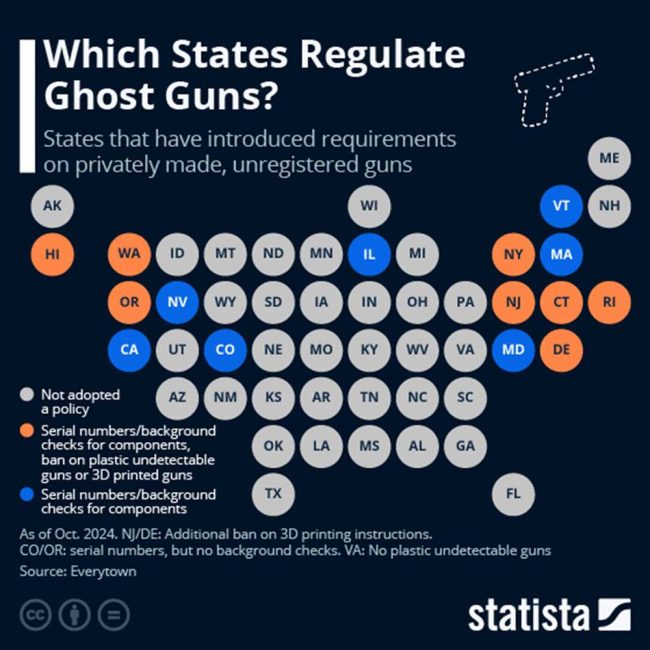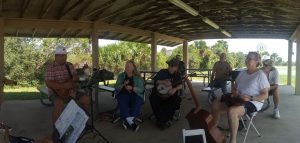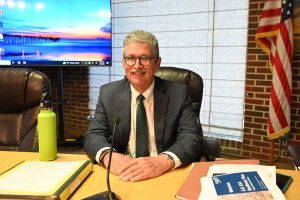
To include your event in the Briefing and Live Calendar, please fill out this form.
Weather: Mostly clear. Highs around 80. Monday Night: Partly cloudy. Lows in the lower 60s.
- Daily weather briefing from the National Weather Service in Jacksonville here.
- Drought conditions here. (What is the Keetch-Byram drought index?).
- Check today’s tides in Daytona Beach (a few minutes off from Flagler Beach) here.
- Tropical cyclone activity here, and even more details here.
Today at a Glance:
In court: Brian Ross Pirraglia goes on trial on a first-degree murder charge in the overdose death of Brian Oshea three and a half years ago in Palm Coast. The trial begins with jury selection before Circuit Judge Dawn Nichols at 8:30 a.m. in Courtroom 401. It is Nichols’s first full trial as Flagler County’s felony judge. See: “Brian Pirraglia Indicted on 1st Degree Murder Charge in Fentanyl Overdose Death of Brian Oshea, 39.”
The three-member East Flagler Mosquito Control District Board meets at 10 a.m. at District Headquarters, 210 Airport Executive Drive, Palm Coast. Agendas are available here. District staff, commissioners and email addresses are here. The meetings are open to the public.
The Flagler County Commission meets in workshop at 1 p.m. at the Government Services Building, 1769 E. Moody Boulevard, Building 2, Bunnell. The commission will discuss capital projects, It will also hear from Mark Langello, the developer and a member of the county’s planning board, about the impact fees he paid in 2006-08 and had sought to be reimbursed. Access meeting agendas and materials here. The five county commissioners and their email addresses are listed here.
The Flagler County Land Acquisition Committee meets at 3:30 p.m. at the Government Services Building, 1769 East Moody Boulevard, Bunnell.
The Flagler County Commission meets at 5 p.m. at the Government Services Building, 1769 E. Moody Boulevard, Building 2, Bunnell. Access meeting agendas and materials here. The five county commissioners and their email addresses are listed here.
Nar-Anon Family Groups offers hope and help for families and friends of addicts through a 12-step program, 6 p.m. at St. Mark by the Sea Lutheran Church, 303 Palm Coast Pkwy NE, Palm Coast, Fellowship Hall Entrance. See the website, www.nar-anon.org, or call (800) 477-6291. Find virtual meetings here.
Notably: Something new to be bewildered about. From Statista: “A case on ‘ghost guns’ has gone to the U.S. Supreme Court. Ghost guns are homemade guns that are unserialized and therefore untraceable. Gun rights groups are challenging a regulation brought in under the Biden administration which says that companies selling separate components of a gun must follow the same rules as those who are selling traditional, fully constructed firearms. This includes carrying out background checks on buyers and adding serial numbers to the DIY kits. Manufacturers and pro-gun groups say that the Bureau of Alcohol, Tobacco, Firearms and Explosives (ATF) is overstepping its authority by reclassifying gun kits and gun components as firearms, claiming that such weapons kits do not meet the “firearm” definition under law. Anti-gun groups warn, however, that if the restriction is overturned, so-called ghost gun kits could be sold to teenagers, criminals and people with a history of mental illness.” Pro-gun groups prove once again that they are our white collar if red-spattered terrorists.
View this profile on Instagram
![]()
The Live Calendar is a compendium of local and regional political, civic and cultural events. You can input your own calendar events directly onto the site as you wish them to appear (pending approval of course). To include your event in the Live Calendar, please fill out this form.
January 2026
Free For All Fridays With Host David Ayres on WNZF
Scenic A1A Pride Meeting
Friday Blue Forum
Acoustic Jam Circle At The Community Center In The Hammock
Flagler Beach Farmers Market
Coffee With Flagler Beach Commission Chair Scott Spradley
Grace Community Food Pantry on Education Way
Gamble Jam at Gamble Rogers Memorial State Recreation Area
Stetson University Concert Choir in Concert with Orlando Philharmonic
For the full calendar, go here.

“Max Mendoza’s parents awakened just after dawn to the echoing clap-pop of a gunshot, and ran from their bedroom to find their 12-year-old son propped against the couch, eyes wide in pain, terror and surprise. “It’s the real one. It’s the real one,” Max whispered, clutching his chest, seemingly astounded that a weapon resembling a toy, a cheap-looking brown-and-black pistol, could end his life in an instant. But it did. Investigators in this city just south of San Diego are still trying to determine exactly what happened on that Saturday morning in July — if the seventh-grader accidentally shot himself, or if his 15-year-old friend, who the police say had brought the weapon into the apartment, discharged it while showing it off. What is certain is the kind of weapon that killed Max. It was a “ghost gun.” Ghost guns — untraceable firearms without serial numbers, assembled from components bought online — are increasingly becoming the lethal weapon of easy access for those legally barred from buying or owning guns around the country. The criminal underground has long relied on stolen weapons with filed-off serial numbers, but ghost guns represent a digital-age upgrade, and they are especially prevalent in coastal blue states with strict firearm laws.
–From “‘Ghost Guns’: Firearm Kits Bought Online Fuel Epidemic of Violence,” by Glenn Thrush,. The New York Times, Nov. 14, 2021.







































Ray W, says
The Texas Tribune reports that a state legislator, Brooks Landgraf (R) Odessa, recently introduced several bills titled Texas STRONG to “provide millions of dollars to the state to seal abandoned wells, which, in some instances, are causing massive blowouts of toxic liquid and creating pools of wastewater.”
Here are some of the bullet points from the article:
– The head of the Texas Railroad Commission, Danny Sorrells, recently advised the legislature that its current $226 million budget could not keep up with the expense of plugging and cleaning up Permian Basin orphan wells that are either leaking oil or gas or unexpectedly bursting with briny water; it asked for an additional $100 million for the upcoming fiscal year.
– The Commission currently uses a priority system to decide which wells are first plugged. “Priority 1 wells pose environmental, economic and safety risks — wells it would typically seal first.” But Sorrells said cleaning up uncontrolled flows of water from abandoned wells had become an unsustainable emergency.
– Current Texas tax law divides collected oil and gas company revenue (over $8 billion in the 2023-2024 fiscal year) between schools, highways, and a “rainy-day” fund.
– If passed, the oil and gas company tax revenue allocation would remain roughly the same for schools and highways, but some of the money formerly directed to the rainy-day fund would be reallocated.
– One percent of the rainy-day pool of money would pay plugging abandoned wells, as directed by the Texas Railroad Commission.
– Another one percent of the money would bolster emission reductions, as directed by the Texas Commission on Environmental Quality.
– Up to $500 million per year would be distributed via grants to oil and gas producing counties for infrastructure repairs, or to expand emergency or health care or educational services funding, or to expand workforce development programs.
– Any other money redirected by the legislation would be used to “ease property taxes statewide.”
– The federal 2021 Bipartisan Infrastructure Law set aside $4.7 billion to plug orphan wells on private and public land. Texas received an initial $25 million from the law. In January 2024, it received an additional $80 million. The railroad commission used the $105 million to plug 737 wells.
– On its own, Texas spent $63 million in both 2023 to plug 1,754 wells and 2024 to plug 1,012 wells.
– “Wells continue to erupt despite the commission’s efforts.
“At least eight erupted with briny water since October 2023. …
“In December 2023, an orphaned well blew out in Imperial, a community roughly 63 miles southwest of Odessa. That well alone took more than two months and $2.5 million to clean up. Another well in Toyah erupted in October this year, releasing a furious torrent of water that took an oil and gas company weeks to contain.”
– State regulators associate the blowouts with “produced water injections”, but they need additional money to assign a team of inspectors to investigate causation of the blowouts.
Make of this what you will.
Me? Something tells me that not all orphaned oil and gas wells are equal. Texas spends $105 million in federal money to clean up or plug 737 wells, or $147k per well, yet it spends $63 million in state money to clean up or plug 2766 wells, or $23k per well. Could it be that the federal money went toward Priority 1 wells and the state money went to clean up less dangerous wells?
Something also tells me that state representative Landgraf wonders whether federal stimulus money for plugging wells and cleaning up polluted land surrounding the wells is about to dry up. That not only Texas, but other states, too, are going to have to introduce legislation to allocate state money to pay for cleaning up the thousands of messes left behind by oil and gas companies that chose to walk away from their wells when they were done extracting from them.
From prior readings, I understand that there are roughly 60,000 orphan wells nationwide that need cleanup and plugging.
Various state regulatory structures commonly require oil and gas companies to post a bond before receiving a permit to drill. In North Dakota, the bond amount was at one recent time $70k per well. If an oil or gas company plugs the well and cleans up the nearby land, it gets the $70 million back. There are wells out there that only need concrete plugging. In that case, if it costs less than $70k to plug such a well, the calculation is easy. Plug the well and get the bond money back.
But what if the overall plugging and cleaning cost was $2.5 million, as it recently was for the suddenly toxic water spewing Imperial well?
Is it irrational to argue that any oil and gas company chief financial officer would consider choosing to walk away from a $70k bond rather than pay out $2.5 million in cleanup costs? For the oil and gas companies, might abandoning a well and letting state or federal agencies pay the $2.5 million for cleanup be thought of as an acceptable business bargain?